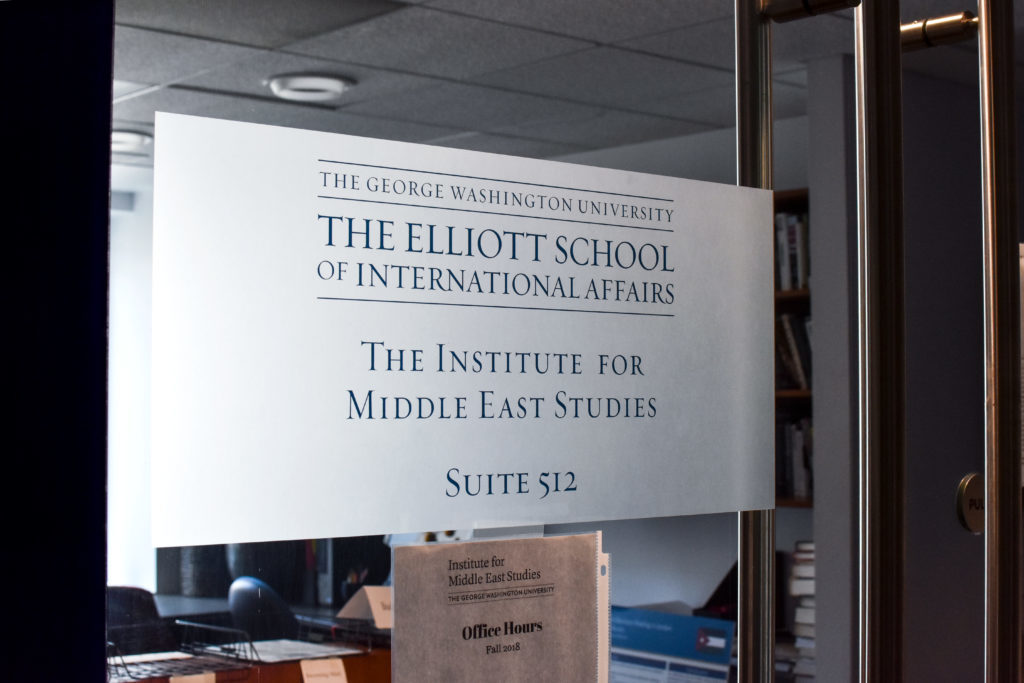Updated: September 5, 2019 at 12:01 p.m.
More than a decade after launching at GW, a center dedicated to Middle East research and teaching is working to raise its profile among researchers in the region nationally.
The GW Institute for Middle East Studies, housed in the Elliott School of International Affairs, will hold its first annual graduate student symposium later this month amid its recent partnering with the Middle East Studies Association of North America, an organization that promotes the study of the region. Interim IMES Director William Youmans, an associate professor of media and public affairs, said the institute will continue to bring scholars of the region together and grow its expertise.
“IMES is a dynamic place that is open, inviting and supportive,” he said in an email. “Anyone interested in studying the Middle East at the University should be involved.”
Almost 50 faculty members are affiliated with IMES. The institute holds an annual conference and a film and speaker series for events like book launches, in addition to publishing research in several academic journals, according to its website.
MESA collaboration
The Middle East Studies Association, which had been located at the University of Arizona since 1981, signed a memo of understanding last month with IMES to establish its headquarters within the institute at the Elliott School.
MESA is a nonprofit that promotes the study of the Middle East through educational programs and scholarly publications, like The Review of Middle East Studies, according to MESA’s website. Youmans said in the release that MESA has been “foundational” to the field of Middle East studies.
“GW has also made tremendous strides in this area thanks to a deep roster of leading researchers, some of whom serve in MESA’s leadership,” he said.
Faculty said MESA members will continue the organization’s work studying the Middle East following its move, but GW will provide a new home for the body’s executive functions, elevating the University’s profile as a “leading center” for studying the region.
“As the professional center of the field, having it at GWU could help highlight the University’s growing expertise on Middle East affairs, but it’s an independent, international organization that has its own interests in being in D.C. now,” Youmans said about MESA.
Nathan Brown, a former director of IMES and a professor of political science and international affairs, said the move will lead to more Middle East scholars visiting campus to share their research. He said MESA will continue its work “to connect scholars throughout the world interested in the Middle East” by holding its annual scholarly conference and publishing its academic journal on Middle East research.
He added that the association’s leaders want to be able to use the resources that the District and the University have to offer, like a well-established background in Middle East studies, to expand the group’s ability to connect individuals interested in studying the Middle East. Brown said the organization’s move to the Elliott School will give faculty members more opportunities to work with MESA and potentially give students more part-time work opportunities.
“The hope is that by placing it in a city rich in institutions focusing on the Middle East and in a university with a strong commitment to Middle Eastern studies, informal as well as formal ties will develop,” Brown said in an email.
Dina Khoury, the president-elect of MESA from December 2019 to December 2021 and a professor of history and international affairs, said she does not expect the move to affect the work each MESA member does, but it will give the organization more opportunities to collaborate with students and faculty interested in Middle East research and education.
Khoury said the group’s executive director and the IMES director will work out the specific details of MESA’s move. The association named a new director, Jeffrey Reger, who will begin in his position starting Sept. 1.
“We are grateful for GWU for giving us the space and resources to establish our headquarters,” she said in an email.
Graduate student symposium
The institute will hold its inaugural graduate student symposium, entitled “Development, Humanitarianism and Security in the Middle East: Legacies and Futures,” on Sept. 20, which will feature several panel discussions on interventions in the Middle East.
The panels will respectively focus on security and geopolitics, humanitarianism and development in the region. Sarah Pursley, an associate professor of Middle East and Islamic studies at New York University, will conclude the symposium with a keynote address.
Alyssa Bivins, a second-year doctoral student and a coordinator of the symposium, said the event’s three panel topics were chosen by graduate students associated with IMES. She said the symposium is a way for graduate students to present key ideas and learn about top researchers in the field.
More than 10 graduate students will participate in panels for the symposium, according to the institute’s website.
“This is an event that is both backward-looking and forward-looking,” Bivins said. “We want to allow scholars to share their critiques of the past but also discuss their hopes and predicted challenges of the futures in the Middle East.”








